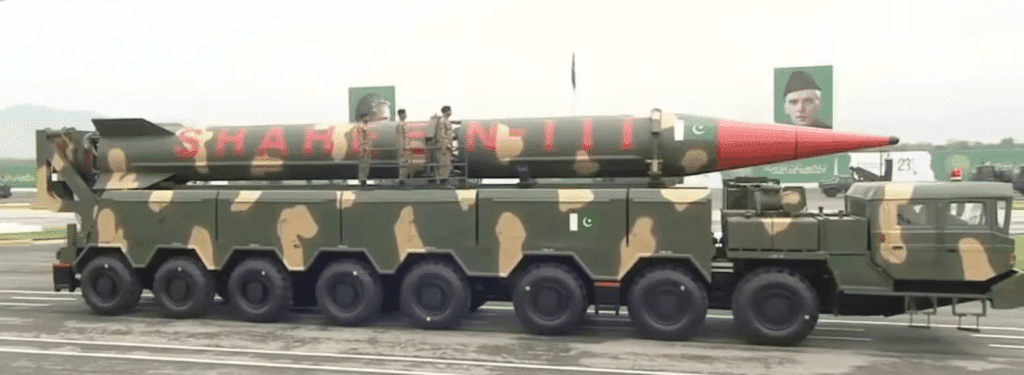Pakistan’s expanding missile arsenal has raised alarm bells across South Asia, with the capability to target Indian military installations in the Andaman and Nicobar Islands. This development has not only intensified India’s security concerns but has also caught the attention of global powers, particularly the United States. The situation highlights the evolving dynamics of strategic deterrence in the region.
1. Pakistan’s Missile Capability: A New Threat to Indian Strategic Assets
Pakistan’s Shaheen-III missile, with a range of 2,750 kilometers, stands out as a game-changer in the region’s security architecture. The missile’s reach extends beyond mainland India, making critical installations in the Andaman and Nicobar Islands vulnerable. These islands serve as a strategic outpost for India, enabling it to monitor and control vital sea lanes in the Indian Ocean.
Alongside the Shaheen-III, Pakistan’s Babur series of cruise missiles offers precision targeting with stealth capabilities. These advancements are believed to be supported by technological assistance from China and possibly North Korea, raising further concerns about proliferation.
“The capability to strike targets as far as the Andamans significantly enhances Pakistan’s deterrence posture against India,” said a senior defense analyst. “It’s not just about geographical reach but also about projecting power and influence in the region.”
2. Implications for India’s Security Strategy
India’s bases in the Andaman and Nicobar Islands are crucial for its maritime strategy. Positioned at the crossroads of major sea lanes, these bases enable India to monitor activities in the Indian Ocean, particularly those of China and Pakistan. The islands also serve as a staging ground for the Indian Navy’s operations.
The potential threat from Pakistan’s missiles has prompted India to reassess its defense posture. Key measures under consideration include:
- Enhanced Missile Defense Systems: India is likely to accelerate the deployment of its advanced ballistic missile defense systems to shield key installations.
- Increased Surveillance: Surveillance capabilities in the region will need bolstering to detect and neutralize potential threats at an early stage.
- Strengthened Naval Presence: The Indian Navy is expected to enhance its operational readiness in the region, focusing on rapid response capabilities.
“The Andaman and Nicobar Islands are critical to India’s strategic calculus. Any threat to these bases directly impacts India’s ability to project power and ensure regional stability,” said a former naval commander.
3. Global Reactions: US Concerns and China’s Role
The United States has expressed unease over Pakistan’s missile developments, particularly in the context of their potential destabilizing effects. In recent months, Washington has imposed sanctions on Pakistani entities involved in missile production, citing violations of international non-proliferation norms.
“Pakistan’s missile advancements are a matter of concern for global security. The ability to target distant bases raises questions about the proliferation of sensitive technologies,” stated a US State Department official.
China’s involvement in Pakistan’s missile program adds another layer of complexity. Beijing has long been a strategic ally of Islamabad, providing economic and military assistance. This partnership, often seen as a counterbalance to India’s growing influence, has further complicated the region’s security dynamics.
Balancing Deterrence and Stability
The introduction of long-range missile capabilities by Pakistan underscores the fragile nature of South Asia’s security environment. Both India and Pakistan are nuclear-armed states with a history of conflicts and unresolved disputes. The addition of advanced weaponry heightens the risk of miscalculation and escalation.
Experts argue that a balanced approach is essential to maintaining stability. While India must strengthen its defenses, it also needs to engage diplomatically with Pakistan to address underlying tensions. Similarly, global powers like the US and China have a role to play in ensuring that the region does not descend into a dangerous arms race.
Conclusion
Pakistan’s development of missiles capable of targeting Indian bases in the Andaman and Nicobar Islands marks a significant shift in the regional security landscape. As New Delhi grapples with this emerging challenge, it must adopt a multifaceted strategy that combines robust defense measures with proactive diplomacy. For the international community, this development serves as a reminder of the critical need for sustained efforts to prevent proliferation and maintain strategic stability in one of the world’s most volatile regions.
Also Read-1. 3 Khalistani Terrorists Killed in UP Encounter: Key Details and Implications
2. Bangladesh Sends Diplomatic Note to India Seeking Sheikh Hasina’s Return: 3 Key Implications
Reference- To know More Click Here.

